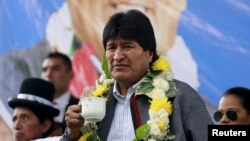President Evo Morales had seemed exempt from the scandal that has besmirched much of South America's left, but an alleged influence-peddling affair involving a woman who bore him a child comes at the most inopportune of moments.
Bolivians decide in a vote Sunday whether he can run for a fourth term.
Morales pulverized the opposition in the early years of his decade-long presidency and cut poverty as he empowered Bolivia's long-downtrodden native majority. In 2014, he won re-election with 60 percent of the vote.
But the Andean nation's first indigenous president faces the growing prospect that his current term will be his last.
Polls indicate voters are about evenly split — with some 15 percent undecided — on Sunday's referendum on whether to amend the constitution so Morales can run in 2019 for a fourth consecutive term.
Bombshell revelation
The potential spoiler for Morales is a revelation this month by an opposition-aligned journalist that an ex-lover secured a top job with a Chinese construction company that has obtained nearly $500 million in contracts with the state.
The allegations are compounded by tragedy: The woman, Gabriela Zapata, gave birth in 2007 to a child sired by Morales. The infant died but neither the president nor his ex-girlfriend will explain the circumstances.
"I never saw her again. I did not know that she worked in that company,'' the 56-year-old Morales said on TV after this month's bombshell revelation.
A photo later emerged of Morales with his arm around Zapata at Carnival in Oruro last year. Morales said it was coincidence, saying people approach him all the time for such photos. Another photo circulating shows Zapata's neocolonial mansion in an elite southern La Paz enclave.
A bachelor, Morales has two children with two other women and has generally succeeded in keeping his private life out of the headlines.
In 2013, Zapata became general manager for Bolivia of China CAMC Engineering Co. Ltd., whose contracts with the state include one signed last year for a $177 million fertilizer plant. All but one of the contracts were no-bid.
Zapata, 29, has denied she got the job due to government influence.
If an isolated case, the scandal might not weigh on Sunday's vote.
But there have been plenty of others — though never before involving Morales directly.
Other accusations
The most damaging scandal involves accusations that officials have skimmed millions from the government-managed Fondo Indigena, which supports agricultural and public works in the countryside. None of the 70 people under investigation, however, are senior officials from the governing Movement Toward Socialism movement.
"It's not just any old accusation. Combined with others it's the worst blow yet to Morales' image of incorruptibility and will impact the vote,'' said Carlos Cordero, a political scientist at the Universidad Mayor de San Andres.
Morales presided over Bolivia's biggest economic boom as prices for raw materials soared just as he took office, constructing airports, highways and the pride of La Paz, an Austrian-built aerial tramway system, while putting a Chinese-built satellite into space.
"Market-based democracy and an authoritarian political model were key to his government,'' said Eduardo Gamarra, a political scientist at Florida International University.
The political opposition and media were suffocated, just like his late ally Hugo Chavez did in Venezuela,
But unlike Venezuela, whose leftist leaders are now on the ropes after the opposition won control of the National Assembly in December, Morales kept confiscations of land and private companies to a minimum.
Economy
Bolivia's revenues from natural gas and minerals, which account for three-fourths of its exports, were down 32 percent last year. Economists say Morales wasted the opportunity to diversify, leaning on extractive industries to pay for populist programs.
Under Morales, average per capita income rose from $873 to $3,119 and a new indigenous bourgeoisie was born.
But judicial corruption became endemic, jail overcrowding worsened and health care did not improve.
At the same time, press freedom suffered as major news media were purchased by people friendly with the government and critical media complained that authorities were harassing them with trumped up accusations of tax and labor law violations.
Support for Morales nevertheless remains strong among the Quechua and Aymara of Bolivia's highlands.
"They say a lot of things about Evo, but thanks to Evo I have my house and the school in our neighborhood improved,'' said Rosa Limachi, a housewife in a poor district of El Alto, the teeming city on a plateau above La Paz.




